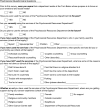High levels of untreated distress and fatigue in cancer patients
- PMID: 15162149
- PMCID: PMC2410292
- DOI: 10.1038/sj.bjc.6601887
High levels of untreated distress and fatigue in cancer patients
Abstract
The purpose of the study was to assess a large representative sample of cancer patients on distress levels, common psychosocial problems, and awareness and use of psychosocial support services. A total of 3095 patients were assessed over a 4-week period with the Brief Symptom Inventory-18 (BSI-18), a common problems checklist, and on awareness and use of psychosocial resources. Full data was available on 2776 patients. On average, patients were 60 years old, Caucasian (78.3%), and middle class. Approximately, half were attending for follow-up care. Types of cancer varied, with the largest groups being breast (23.5%), prostate (16.9%), colorectal (7.5%), and lung (5.8%) cancer patients. Overall, 37.8% of all patients met criteria for general distress in the clinical range. A higher proportion of men met case criteria for somatisation, and more women for depression. There were no gender differences in anxiety or overall distress severity. Minority patients were more likely to be distressed, as were those with lower income, cancers other than prostate, and those currently on active treatment. Lung, pancreatic, head and neck, Hodgkin's disease, and brain cancer patients were the most distressed. Almost half of all patients who met distress criteria had not sought professional psychosocial support nor did they intend to in the future. In conclusion, distress is very common in cancer patients across diagnoses and across the disease trajectory. Many patients who report high levels of distress are not taking advantage of available supportive resources. Barriers to such use, and factors predicting distress and use of psychosocial care, require further exploration.
Figures
References
-
- Bezjak A, Ng P, Skeel R, Depetrillo AD, Comis R, Taylor KM (2001) Oncologists' use of quality of life information: results of a survey of Eastern Cooperative Oncology Group physicians. Qual Life Res 10: 1–13 - PubMed
-
- Blake-Mortimer J, Gore-Felton C, Kimerling R, Turner-Cobb JM, Spiegel D (1999) Improving the quality and quantity of life among patients with cancer: a review of the effectiveness of group psychotherapy. Eur J Cancer 35: 1581–1586 - PubMed
-
- Bottomley A (1997) Where are we now? Evaluating two decades of group interventions with adult cancer patients. J Psychiatr Mental Health Nurs 4: 251–265 - PubMed
-
- Canadian Association of Psychosocial Oncology (1999) Standards: Canadian association of psychosocial oncology. Canadian Association of Psychosocial Oncology, Montreal, Canada
-
- Carlson LE, Bultz BD (2002) Efficacy vs. cost of psychosocial interventions: an evidence-based call for action. Oncol Exchange 1: 34–51
Publication types
MeSH terms
LinkOut - more resources
Full Text Sources
Medical
Miscellaneous



